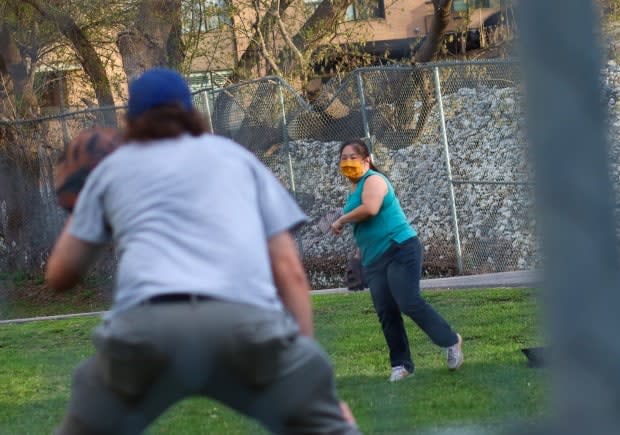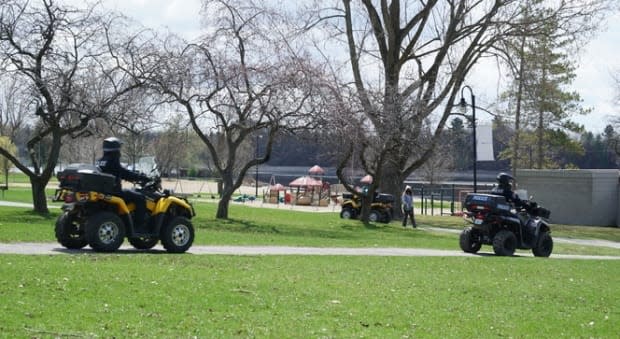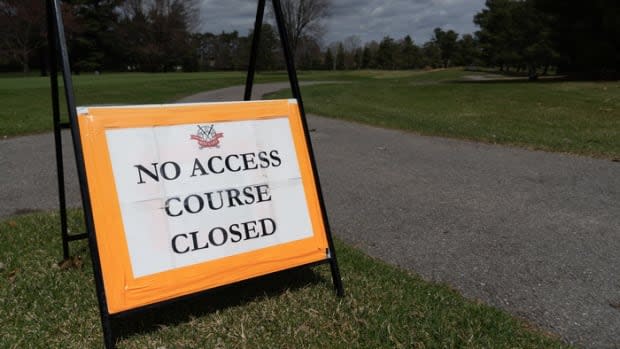What you need to know about COVID-19 in Ottawa on Sunday, April 18

Recent developments:
Health officials in Ottawa reported 283 cases of COVID-19 on Sunday.
The province has walked back rules that would have allowed police officers to conduct random stops.
Playgrounds and park structures are also no longer off-limits.
What's the latest?
The Ontario government has walked back some of the COVID-19 restrictions it introduced late last week, including expanded police powers that would have allowed officers to stop people at random and ask why they weren't at home.
Now, officers will only be able to stop vehicles or people if they are suspected of participating in an organized public event or social gathering.
Police forces in Ottawa, Kingston, Cornwall and Belleville were among those that said they would not have carried out the random stops.
The province has also reversed course on declaring playgrounds and play structures off-limits. Ottawa Mayor Jim Watson was one of the officials who urged the province to reconsider that measure.
Ottawa reported another 283 COVID-19 cases Sunday, while 143 cases were logged in western Quebec.
How many cases are there?
The region is in a record-breaking third wave of the pandemic that includes more dangerous coronavirus variants, straining test sites and filling hospitals.
As of Saturday, 21,835 Ottawa residents have tested positive for COVID-19. There are 3,339 known active cases, 18,014 resolved cases and 482 deaths.
Public health officials have reported more than 40,000 COVID-19 cases across eastern Ontario and western Quebec, including more than 33,900 resolved cases.
Elsewhere in eastern Ontario, 162 people have died. In western Quebec, the death toll is 185.
Akwesasne has had more than 590 residents test positive, evenly split between its northern and southern sections.
Kitigan Zibi has had 27 cases. Tyendinaga Mohawk Territory has had 11, with one death.
CBC Ottawa is profiling those who've died of COVID-19. If you'd like to share your loved one's story, please get in touch.
What can I do?
Eastern Ontario:
Ontario is under a stay-at-home order that has been extended until at least May 20.
People can only leave home for essential reasons such as getting groceries, seeking health care and exercising. They're asked to only leave their immediate area or province if absolutely necessary.
Checkpoints are set to go up at border crossings between eastern Ontario and western Quebec on Monday.
The vast majority of gatherings are prohibited, with exceptions that include people who live together, those who live alone and pair up with one other household, and small religious services.
Most non-essential businesses can only offer curbside pickup. Access to malls is restricted, and big-box stores can only sell essential items.
Gyms and personal care services must close, while restaurants are only available for takeout and delivery.
Ontario is indefinitely moving to online learning after April break. Daycares remain open for now.
Local health units and communities can also set their own rules, as Prince Edward County's is doing around travel and Kingston is doing for Breakwater Park.
Ottawa Mayor Jim Watson has said bylaw officers will inspect stores and respond to complaints about homes and parks.

Western Quebec
Premier François Legault has said the situation is critical in Gatineau and is asking people there to only leave home when it's essential.
Schools, gyms, theatres, personal care services and non-essential businesses are closed until April 25 in the Outaouais.
Private gatherings are banned, except for a person who lives alone seeing one other household. Distanced outdoor exercise is allowed in groups up to eight people and masks are no longer mandatory if doing so.
The curfew is from 8 p.m. to 5 a.m.
People there are asked to only have close contact with people they live with, be masked and distanced for all other in-person contact and only leave their immediate area for essential reasons — under threat of a fine if they go to a yellow or green zone.
Distancing and isolating
The novel coronavirus primarily spreads through droplets that can hang in the air.
People can be contagious without symptoms, even after getting a vaccine. Coronavirus variants of concern are more contagious and are spreading quickly.
This means it is important to take precautions now and in the future like staying home while sick — and getting help with costs if needed — keeping hands and surfaces clean and maintaining distance from anyone you don't live with, even with a mask on.
Masks, preferably ones that fit snugly and have three layers, are mandatory in indoor public settings in Ontario and Quebec.
OPH says residents should wear masks outside their homes whenever possible.

Health Canada recommends older adults and people with underlying medical conditions and/or weakened immune systems get help with errands.
People have to show proof of a recent negative COVID-19 test to enter Canada by land without a fine and have to pay for their stay in a quarantine hotel if entering by air.
Anyone with COVID-19 symptoms should self-isolate, as should those who've been ordered to do so by their public health unit. The length varies in Quebec and Ontario.
Vaccines
Four COVID-19 vaccines have been deemed safe and approved in Canada.
Canada's task force said first doses offer such strong protection that people can wait up to four months to get a second.
About 525,000 doses have been given out in the Ottawa-Gatineau region since mid-December, including about 238,000 doses to Ottawa residents and about 93,000 in western Quebec.
Eastern Ontario
Ontario is now in Phase 2 of its vaccine rollout, with the first doses during Phase 1 generally going to care home residents and health-care workers.
All health units in eastern Ontario are now vaccinating people age 60 and older at their clinics. It's 55 and over in Renfrew County. People can book appointments online or over the phone at 1-833-943-3900.
People who are above or turning age 55 can contact participating pharmacies for a vaccine appointment.
Phase 2 now includes people with underlying health conditions, followed by essential workers who can't work from home in May.
Phase 3 should involve vaccinating anyone older than 16 starting in July.

Local health units have some flexibility in the larger framework, so check their websites for details.
The province has opened up appointments for people age 50 to 54 in Ottawa's K1T, K1V and K2V "hot spot" postal codes, though supply is currently limited.
Separately, some Ottawans in certain priority neighbourhoods can check their eligibility online and make an appointment through the city. This should soon include all education workers and staff in large workplaces.
Indigenous people over age 16 in Ottawa can make an appointment the same way.
The health unit for the Belleville area says this hot spot strategy means some of its doses are being sent elsewhere and it will have to postpone some appointments.
WATCH | Doctors say Ontario ignored crucial warnings about pandemic's third wave
Western Quebec
Quebec also started by vaccinating people in care homes and health-care workers.
The vaccination plan now covers people age 55 and older, along with local essential workers and people with chronic illnesses.
People age 55 to 79 can line up in their vehicles to get a ticket for a walk-up appointment at Gatineau's Palais des Congrès.
Officials expect everyone who wants a shot to be able to get one by by Fête nationale on June 24.
People who qualify can make an appointment online or over the phone. Pharmacists there have started giving shots with appointments through the province, not individual pharmacies.
Symptoms and testing
COVID-19 can range from a cold-like illness to a severe lung infection, with common symptoms including fever, a cough, vomiting and loss of taste or smell. Children tend to have an upset stomach and/or a rash.
If you have severe symptoms, call 911.
Mental health can also be affected by the pandemic, and resources are available to help.
In eastern Ontario:
Anyone seeking a test should book an appointment. Check with your area's health unit for clinic locations and hours.
Ontario recommends only getting tested if you have symptoms, if you've been told to by your health unit or the province, or if you fit certain other criteria.
People without symptoms but who are part of the province's targeted testing strategy can make an appointment at select pharmacies. This week that includes school staff and students.
Travellers who need a test have very few local options to pay for one.
In western Quebec:
Tests are strongly recommended for people with symptoms and their contacts.
Outaouais residents can make an appointment and check wait times online.
Call 1-877-644-4545 with questions, including if walk-in testing is available nearby.
First Nations, Inuit and Métis:
First Nations, Inuit and Métis people, or someone travelling to work in a remote Indigenous community, are eligible for a test in Ontario.
Akwesasne has a COVID-19 test site by appointment only and a curfew of 11 p.m. to 5 a.m.
Anyone returning to the community on the Canadian side of the international border who's been farther than 160 kilometres away — or visited Montreal — for non-essential reasons is asked to self-isolate for 14 days.
People in Pikwakanagan can book a COVID-19 test by calling 613-625-1175. Anyone in Tyendinaga who's interested in a test can call 613-967-3603 and in Kitigan Zibi, 819-449-5593.
Inuit in Ottawa can call the Akausivik Inuit Family Health Team at 613-740-0999 for service, including testing and vaccines, in Inuktitut or English on weekdays.
For more information

 Yahoo Finance
Yahoo Finance 